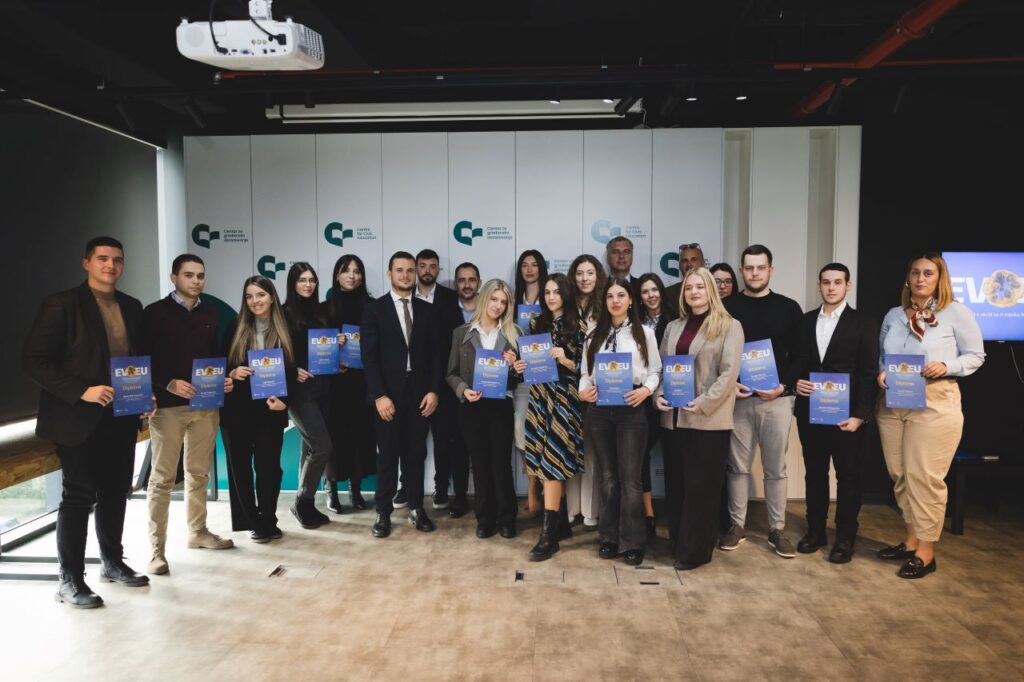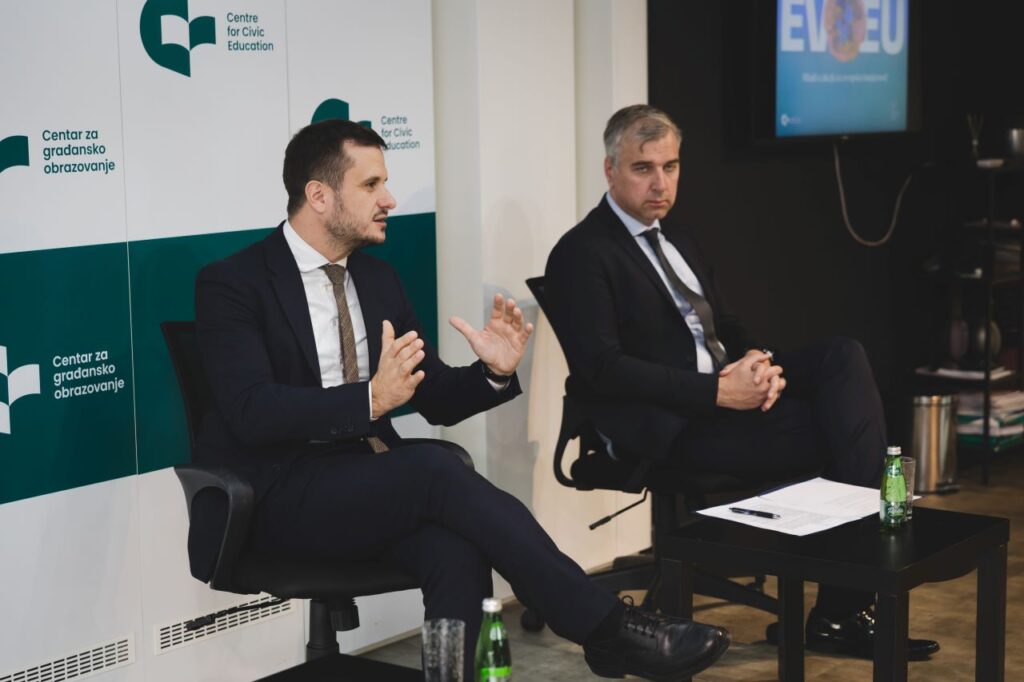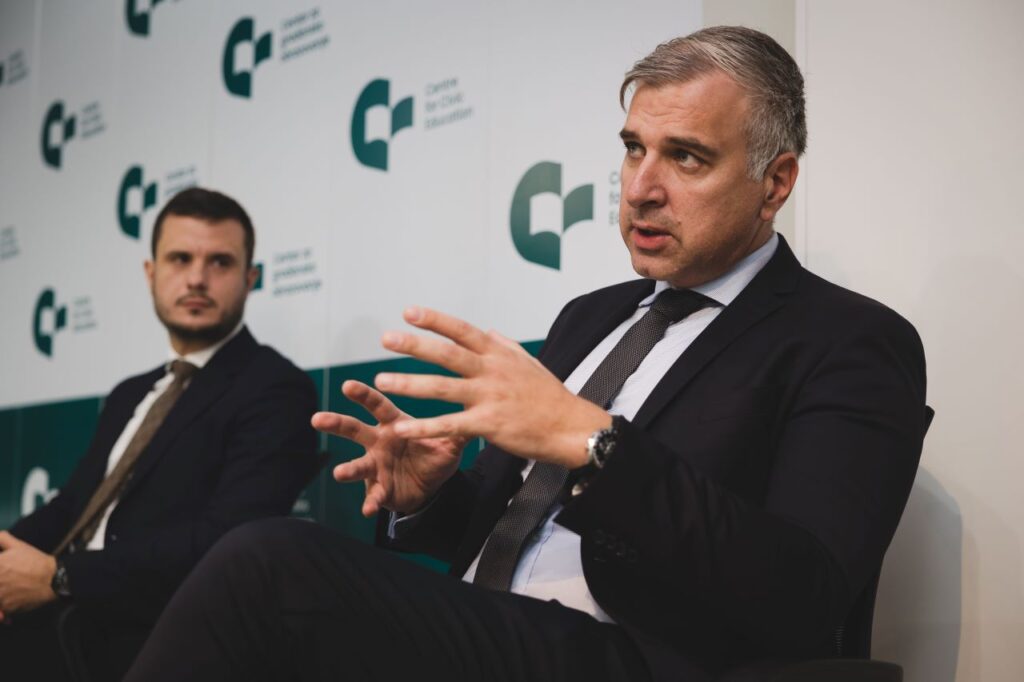The entire society, not just the Government, joins the EU. Therefore, it is essential for all parts of society to be continuously educate on the complex topics of EU negotiations. Joint initiatives between the NGO sector and institutions in this regard are highly valuable, as emphasized during the closing panel and the diploma award ceremony for participants of the EU Negotiation School, organized by the Centre for Civic Education (CCE) within the project “EvoEU: Youth in Action for a European Future!”, supported by the Ministry of European Affairs.
During the EU Negotiation School, held from September to November 2024, 26 young individuals from various sectors had the opportunity to enhance their knowledge on key aspects of EU accession and analyze the challenges Montenegro faces on its path to the EU. The participants were guided by lecturers from academia, the NGO sector, the diplomatic corps, institutions, and independent experts who introduced them to the political and economic dimensions of integration, the process of aligning with EU standards, and the procedural dynamics of negotiations through the comparative experiences of member states and candidate countries. The emphasis was placed on Chapters 23 and 24, which open and close the negotiations, as well as those related to economic policies, environmental protection and climate change, and the Common Agricultural Policy. Additionally, a training on EU project management was conducted, providing practical instructions on developing and implementing projects financed by EU funds. Throughout the programme, the overarching theme was the role of youth in the Europeanization of society.
The programme concluded with a panel discussion “The Importance of Europeanization in Shaping the Region’s Future: Examples from Montenegro and Bosnia and Herzegovina.”
Dr. Predrag Zenović, Montenegro’s Chief Negotiator with EU, emphasized the importance of communicating the European integration process to citizens, particularly to youth, to maintain the process’s momentum. “Preparing young people for full membership in the European community is the key to the future. The only way to transfer the great idea of European integration, with all the obligations it entails, to future generations is to work with those who will carry it forward. This School is an excellent example of collaboration between the Ministry of European Affairs and the NGO sector,” he noted.
Zenović described this year as a “ time of awakening” for the entire EU integration system and reflected on the start of his mandate: “That period was marked by political optimism achieved through consensus between the government and opposition. Political will was formed to complete Montenegro’s legal system, open key chapters on the rule of law, and obtain the famous IBAR”, said Zenović. He announced that “if Montenegro successfully completes all planned activities by the end of the year, the overall result will include three intergovernmental conferences, the IBAR obtained, four chapters closed, and a fully positive European Commission report.”
“As for Bosnia and Herzegovina, we are about to select a new chief negotiator. Our situation is further complicated by our complex constitutional structure, but it is important for all of us in the Balkans to take advantage of this ‘honeymoon’ period of European integration. The responsibility for progress lies with us – we haven’t always implemented the reforms we committed to,” said Branimir Jukić, Ambassador of Bosnia and Herzegovina to Montenegro, during the panel.
He added that European integration has finally taken a positive turn and that Montenegro is leading the process. “Bosnia and Herzegovina can benefit greatly from Montenegro’s experience, which is invaluable. The process of closing chapters under the new methodology, with its revised rules, makes Montenegro’s experience unique and highly beneficial,” he said. Ambassador Jukić also noted that institutions in Bosnia and Herzegovina already use Montenegro’s experience as a guide in their European affairs, expressing confidence that this will significantly contribute to advancing reforms in B&H.
“An essential dimension of the CCE since its inception has been its alternative educational programmes. The EU Negotiation School is one of those programmes that addresses the need to learn and understand the EU’s concepts and policies, as well as what Montenegrin institutions and society must do to democratize to the level required for full membership in this club,” said Petar Đukanović, Programme Director of the CCE, during the diploma ceremony.
“I am grateful to the CCE for demonstrating that young people must be the most informed group about the EU and the accession process and actively involved in affirming European ideas and standards in Montenegro. Lectures by eminent experts expanded my knowledge of EU-related processes and policies, and I acquired new skills. This will greatly aid my professional development as a Montenegrin citizen striving to see the country become the next EU member by implementing necessary reforms,” said Lejla Šabotić, a law student at the University of Montenegro, who successfully completed the EU Negotiation School.
Similar impressions were shared by Maša Babović, who holds a master’s degree in law and works at Gazivoda Law Office. “The EU Negotiation School is an excellent source of new information about the EU and a great opportunity for participants to meet outstanding professionals and interlocutors in their fields. For me, it was particularly valuable to receive additional information and clarifications on certain legal instruments of the Union,” she noted.
“Over nearly two months, the CCE’s EU Negotiation School provided me not only with additional theoretical knowledge and understanding of EU processes but also with practical skills. I had the privilege of learning from experts in various fields of European integration, law, economics, and diplomacy. In the end, the School enabled further networking with colleagues who contribute to this process,” concluded Maja Samardžić, one of the School participants who works at the Montenegrin Parliament’s Committee on Political System, Judiciary, and Administration.
Nikola Obradović, Program Associate



